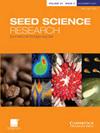Width of the temperature range for seed germination of herbaceous plant species in temperate eastern North America: life cycles, seasons and temperature variation and implication for climate warming
IF 1.9
3区 生物学
Q2 PLANT SCIENCES
引用次数: 1
Abstract
Abstract To persist (without immigration) in habitats with unpredictable environmental conditions, annuals must produce seeds each year or have a seed bank. Thus, we predicted that compared to perennials, annuals have a wider germination temperature range (GTR, the difference in temperature between the week with the highest and the week with the lowest germination during the natural germination season). We determined the GTR via germination phenology data for 350 herbaceous species in 59 families from the eastern USA: summer annuals (SA), 63; winter annuals (WA), 83; monocarpic perennials (MP), 28; and polycarpic perennials (PP), 176. There was no significant phylogenetic signal for the GTR. The width of the GTR during the first spring germination season was 9.6, 8.7 and 8.8°C for MP, PP and SA, respectively, and during the first autumn germination season 12.8, 11.8 and 12.4°C for MP, PP and WA, respectively. Annuals did not have a wider GTR than perennials in either the spring or the autumn germination season. Our data suggest that selection for early germination in either spring or autumn has resulted in only small differences in the GTR. We predict that global warming will have little or no effect on reshaping the germination phenology of herbaceous species of temperate eastern North America.北美洲东部温带草本植物种子发芽的温度范围宽度:生命周期、季节和温度变化及其对气候变暖的影响
摘要为了在环境条件不可预测的栖息地中生存(不迁移),一年生植物必须每年生产种子或拥有种子库。因此,我们预测,与多年生植物相比,一年生植物的发芽温度范围更宽(GTR,自然发芽季节发芽最高的一周和发芽最低的一周之间的温度差)。我们通过美国东部59科350种草本植物的发芽酚学数据确定了GTR:夏季一年生植物(SA),63;冬季一年生植物(WA),83;单果多年生植物(MP),28;和聚结皮多年生植物(PP),176。GTR没有显著的系统发育信号。MP、PP和SA在第一个春季发芽季节的GTR宽度分别为9.6、8.7和8.8°C,MP、PP、WA在第一个秋季发芽季节的宽度分别为12.8、11.8和12.4°C。无论是在春季还是秋季发芽季节,一年生植物的GTR都不比多年生植物宽。我们的数据表明,选择在春季或秋季早期发芽只会导致GTR的微小差异。我们预测,全球变暖对重塑北美东部温带草本物种的发芽表型几乎没有影响。
本文章由计算机程序翻译,如有差异,请以英文原文为准。
求助全文
约1分钟内获得全文
求助全文
来源期刊

Seed Science Research
生物-植物科学
CiteScore
3.60
自引率
4.80%
发文量
23
审稿时长
>12 weeks
期刊介绍:
Seed Science Research, the official journal of the International Society for Seed Science, is a leading international journal featuring high-quality original papers and review articles on the fundamental aspects of seed science, reviewed by internationally distinguished editors. The emphasis is on the physiology, biochemistry, molecular biology and ecology of seeds.
 求助内容:
求助内容: 应助结果提醒方式:
应助结果提醒方式:


